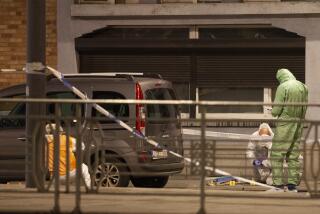Ethnic Discord : In Dutch or in French, the Word Is ‘Bicker’ in Belgium : Through the years, the country’s two linguistic halves have slowly been learning to coexist. But lately, they’ve taken a political step backward.
- Share via
BRUSSELS — Bernard Deltour has a lasting memory of going to Roman Catholic services about 20 years ago as a French-speaking youth in the Dutch-speaking part of Belgium.
“When the priest said a few words in French about fund raising, a group of Dutch-speaking worshipers started praying as loud as they could to drown out the French words,” he recalls with a shudder.
Times have changed and attitudes have softened. Three years ago, the funeral for Deltour’s mother in the Flemish city of Kortrijk was conducted half in French and half in Dutch. “Nobody made a fuss about it,” Deltour says. “It was all very natural and low-key.”
Language still divides Belgium into two halves. Those who speak Dutch--a slight majority of the population--live in the northern region called Flanders, which borders on the Netherlands and is currently the more prosperous part of the country.
The French speakers, who for decades had formed Belgium’s political and intellectual elite, live in the southern region of Wallonia, on the edge of France. They also dominate in officially bilingual Brussels, which is surrounded by Dutch-speaking suburbs.
The two sides of Belgium’s language divide, bound together by their common Catholic religion, lived together mostly with knives drawn for more than a century after Belgium’s founding in 1830. Slowly and quietly they are learning to coexist peacefully, more like the German- and French-speaking Swiss than the increasingly antagonistic French and English parts of Canada.
Gone are the excesses of years past, such as the division of the University of Louvain into two pieces in 1968, when the Dutch-speaking students told the French-speaking students to get out of (the Flemish) town.
Under the terms of the divorce, a new university was established in Louvain-la-Neuve, just across the border in Wallonia. The property settlement was particularly messy: The university library was divided in two, and in some cases Volumes I and III of a set landed in one library and Volumes II and IV in the other.
Animosities still simmer today. Only last year, the Dutch-speaking residents of a Brussels suburb blocked the entrance to a European Community banquet that was to be conducted in French.
In Brussels, where all street signs are legally required to carry both French and Flemish names, vandals from each community have taken to blacking out words in the language of the other. The formerly red-and-white posts that hold traffic lights in some of Brussels’ Flemish suburbs have been repainted black and yellow, the Flemish colors.
The Dutch and French spoken in Belgium have about the same relationship to the languages spoken in Holland and France as American English has to the British version. The accents are markedly different--in fact, the Flemish speak at least three distinct dialects of Dutch--and some words are different.
For example, kuisen means “to clean” in Flanders; in the Netherlands, the verb is schoonmaken. Likewise, French-speaking Belgians say septante for the number 70; in France, it’s soixante-dix (sixty-ten).
Cordiality between Belgium’s Dutch- and French-speakers grows at an agonizingly slow pace--two steps forward, a step and a half back--and right now the direction is decidedly backward. In recent weeks, one Belgian government disintegrated and Prime Minister Wilfried Martens nearly lost his job, all on account of political bickering between the two linguistic groups.
The trouble started when two Wallonian firms asked the national government for licenses to sell arms in the Middle East. Martens, who is Flemish, said yes, even though sentiment in highly pacifistic Flanders runs firmly against arms sales.
The Walloons made the mistake of gloating over their triumph. One outraged Dutch-language newspaper ran a cartoon showing a rooster, the Wallonian symbol, urinating on the head of the Flemish Christian Democratic Party’s leader.
Like two boys shoving each other on a playground, the two sides then launched an escalating series of tit-for-tat.
The Flemish threatened to regionalize the social security system, under which about $30 million a year is now transferred from the more-prosperous Flanders to the less well-off Wallonia. The Walloons said they might not agree to the signing of about $1 billion in new telephone contracts, most of which would go to Flemish firms.
The Walloons demanded a greater share of Belgium’s agricultural assistance. The Flemish threatened to prevent Wallonia from getting the proceeds from a radio and television tax, a source of revenue promised by Wallonia last year to stop a two-month teachers’ strike at French-speaking schools.
Martens’ delicately balanced coalition government, involving five of the 11 parties represented in Parliament, came unglued when the ministers from the Volksunie, one of the more militant Flemish parties, walked out. Martens then put together a new government, his ninth since 1979 and Belgium’s 34th since World War II.
The old wounds continued to fester, and Martens submitted his resignation to King Baudouin on Oct. 4. The king refused his resignation and instead ordered national elections moved up from January to late November, leaving the current government as little more than a caretaker.
Increasingly, however, the political bitterness is more posturing than real, a drama played out for voters as Election Day approaches.
“Belgium is not Yugoslavia,” says Xavier Mabille, co-director of the Center of Socio-Political Research and Information. “There is no animosity between people. After a conflict, politicians go out and have a drink together.”
The electorate is largely unimpressed by the political shenanigans. “My view of the politicians is very negative,” says Charles Speth, a native French-speaker who lives in the Flemish city of Antwerp.
Speth predicts that the political brouhaha will not sour personal relationships between members of the two linguistic communities. He runs an exporting business that he calls Business Marketing International--in English, a neutral language designed to offend neither Dutch- nor French-speaking clients.
Yvette Vanden Bemden, an art historian at the University of Namur in the heart of French-speaking Belgium, has recently been invited to several cities in Flanders to help with the restoration of stained glass, her specialty. The Flemish minister of culture, for example, asked her advice on restoring and protecting the stained glass in the church in the little town of Sint Lenaarts, near the Dutch border.
“At this level, there is no question of language,” says Vanden Bemden, who speaks Dutch with a pronounced French accent. “It is a question of doing the best thing and finding the right person, not necessarily a Flemish person.”
A variety of factors account for experiences such as Vanden Bemden’s.
“It’s a consequence of the economic development of Flanders,” says Lou De Clerck, editor-in-chief of the Gazet van Antwerpen, one of Belgium’s major Dutch-language newspapers.
In the first half of the century, Wallonia’s heavy industry, particularly mining and steel, flourished as Flemish textile mills slumped. Residents of Flanders felt down and out.
“In the 1950s, the economic fortunes of Flanders and Wallonia changed drastically,” wrote Luc Huyse, a sociologist at the University of Louvain. Flanders rode the high-tech wave just as Wallonia’s heavy industry slid into a prolonged decline.
In the 1980s, the Flemish economy grew by an average of nearly 3% a year, compared to only about 1% for Wallonia. Prosperity has slaked Flemish bitterness toward the other half of the country.
Simultaneously, the Flemish have progressed from a repressed majority--they now constitute about 58% of the population--to national political leadership. For decades after Belgium’s beginning in 1830, the intelligentsia and political elite spoke French. Only in 1898 was Dutch so much as recognized as an official Belgian language.
Constitutional changes beginning in 1970 decentralized political power and reduced potential friction points between the two communities. Three regional governments--for Wallonia, Flanders and Brussels--set environmental, housing and energy policy, among others.
Many other compromises were reached. Brussels, previously a French-speaking enclave in the Flemish part of Belgium, became officially bilingual, even though its population is only about 12% Dutch-speaking. At the national level, Belgium’s French-speaking minority was guaranteed that the Cabinet (excluding the prime minister) would be divided equally between the two communities.
The still-evolving administrative structure is massively complex, with five levels of government--one national government, two language communities, three regions, nine provinces and countless municipalities--sharing power. The first task of the new national administration that emerges after next month’s elections will be to simplify the government.
Francis Delperee, a champion of decentralization as head of the University of Louvain’s law faculty, looks forward to a Belgium of two highly autonomous regions, with bilingual Brussels a part of each. The national government would maintain responsibility for financial matters, foreign policy and the national defense; the regions would take care of the rest.
“It’s normal to have competition between two parts of a country,” Delperee says. “New York and Los Angeles don’t have the same interests either.”
Andre Molitor, a political scientist at the University of Louvain and a former private secretary to King Baudouin, believes that Belgium will muddle through. What he wrote 10 years ago rings true today:
“By temperament and by tradition, we Belgians are inclined toward internal quarrels; however, we recoil before spilt blood, and we hate authoritarianism and police regimes. Furthermore, over a long period of time we have developed a remarkable aptitude for negotiation, which contributes to solutions that never satisfy everybody but that are generally accepted.”
A Tale of Two (and a Half) Countries Language divides Belgium into halves. Dutch is spoken in the more prosperous Flanders and French in Wallonia. French speakers also dominate in officially bilingual Brussels. Here is a look at how the parts and the whole fare:
Wallonia Flanders Brussels Belgium Population 3,244,000 5,740,000 964,000 9,948,000 Unemployed people 176,800 210,000 48,500 435,300 Annual per capita income (U.S. dollars) 7,750 8,500 8,450 8,250 Average annual economic growth since 1981 1.0% 2.7% 1.3% 2.1%
Sources: Belgian Economic Affairs Ministry, National Bank of Belgium
More to Read
Sign up for Essential California
The most important California stories and recommendations in your inbox every morning.
You may occasionally receive promotional content from the Los Angeles Times.












